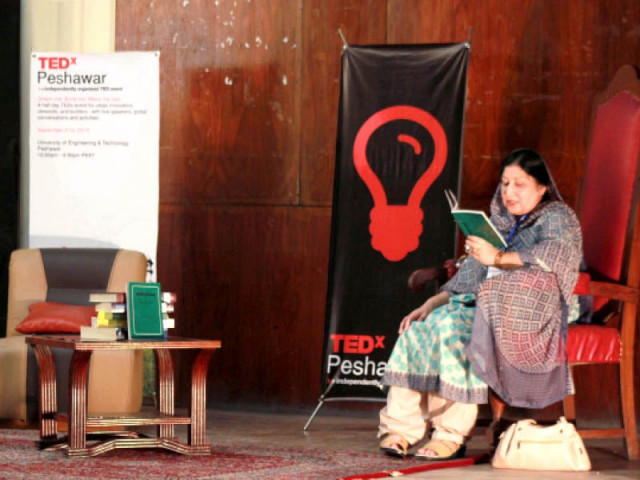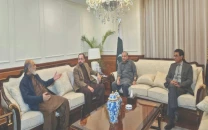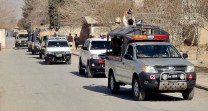TEDx Peshawar: Dream me. Build me. Make me real
Attendance might have been scant, but the audience’s enthusiasm matched the speakers’ keenness.

Attendance might have been scant, but the audience’s enthusiasm matched the speakers’ keenness; everyone in the hall hung on till the very last word. PHOTO: MUHAMMAD IQBAL/EXPRESS DESIGN: MUNIRA ABBAS
TedxPeshawar brought together its own game changers – social innovators, thinkers, entrepreneurs – to bring the future of Peshawar back to the drawing board. Those who watch Ted talks will be familiar with the Ted mission, ‘Ideas worth spreading’. The first ever Tedx in Peshawar on Saturday aimed to do exactly that.
True to Ted’s format, each speaker was given 18 minutes or less to “give the talk of their lives,” however, with six speakers and a four-hour-long event, it is safe to say some enthusiastically ran well over the time limit.
Attendance might have been scant, but the audience’s enthusiasm matched the speakers’ keenness; everyone in the hall hung on till the very last word.
Dr Salma Shaheen
(writer, researcher, novelist)

For Pashto Academy Director Dr Shaheen, the importance of staying in touch with folk culture for the Pukhtun society is paramount. Shaheen’s discussion on how folk music is representative of the past while contextualising the present received much applause from the young attendees. “We can judge our past by narrating and interpreting our folk music,” said the scholar who has authored 18 books on Pashto literature and Pukhtun culture. In a bid to illustrate her idea, Dr Shaheen recited a few songs which “represent the love of those times”, including ‘Lar sha pekhawar ta kamis tor mala rawra.’
“We have to promote and preserve our own literature and culture, make it attractive for our youth – make them feel proud of what they inherit but not without adapting new trends of life.”
Amir Anzur
(webpreneur)

“A small idea can lead to the realisation of big dreams,” Anzur, the dean of Webpreneur academy, took his 18 minute session to discuss hard realities with a soft approach.
“We have to set up a standard for education which can be dispensed online,” said Anzur. The entrepreneur is working with the K-P education department to computerise their systems and to introduce distance learning.
Only expanding access to the internet can take education to an international standard, said Anzur. And he understands this reality as an insider, Anzur started at a technology management consultancy firm and has advised companies including Microsoft, Virgin Media and Oracle.
Joudat Ayaz
(Secretary of Education Department)

Eighteen minutes stretched to 40 when Joudat Ayaz outlined his dreams to reform the Khyber-Pakhtunkhwa (K-P) education system in a speech titled ‘K-P7.0 Dream me, build me, and make me real’.
There are 3.9 million children, 127,000 teachers and 28,000 schools at the elementary and secondary level. Teacher absenteeism, poor infrastructure, insufficient budget allocation have marred this system since 1947. 40% schools do not have electricity. Only 9% schools have internet; even Nigeria has 27 % internet penetration.
“My dream is to change the curriculum completely, to have our graduates penetrate international job markets, to hire good teachers and to ensure clean schools with playgrounds.”
Ayaz did not stop there, “There will be an emphasis on the Pashto language as well as English and learning will be made fun for kids.”
Without computers and the internet we cannot even think about achieving our goals; all schools will be provided internet which they will use to teach and learn, he added.
“An e-filing system will be introduced to ease decision making within the bureaucratic structure and to reduce the burden on government servants.”
Dr Usman Raza
(health policy & management)

Usman Raza, a Fulbright scholar and graduate of Harvard School of Public Health, is working on a health policy and better management of healthcare facilities in K-P. He maintained a computerised system for prescriptions of doctors should be introduced.
“Though Pakistan does not have proper data, 7,000 people in Pakistan die due to these scribbled prescriptions every year, according to a US report,” said Raza.
He added the study states 59% of the prescriptions are not legible, 98% do not mention registered physicians, 55% do not mention the duration for which the drugs are to be used, while 69% do not mention the quantity of drugs to be used. “Most prescriptions have more than three drugs, which is against the law.”
Muhammad Asif
(entrepreneur)

Muhammad Asif said his dreams include introducing reforms in the education system. “Our education system has limited the potential of our minds. It never encourages us to become entrepreneurs, and instead, makes us dependent on government jobs, which are considered the biggest success of our lives.”
Asif said he gave up a lucrative job in America and came to Pakistan to become an entrepreneur. “Now, top companies including Pepsi, Nestle and Facebook along with hundreds of others are using my web applications,” he said, referring to his venture Probist Inc, a web product company.
Muhammad Humayun Akhund
(historian, researcher, writer)

PHOTO COURTESY: WWW.TEDXPESHAWAR.COM
Muhammad Humayun Akhund started off as a patwari. Today, he is considered an expert on the heritage of Peshawar and computerisation of revenue records. He is also the author of ‘Peshawar kay bäm-o-dar’ – a 400-page unpublished book on the history, heritage and culture of the walled city.
“Instead of going forward, we are moving backwards,” he told the audience, adding: “We inherited a lot of heritage from our elders. But instead of preserving it, we turned it into ruins.”
Akhund said almost all the heritage sites of the city are in a complete wreck and require immediate attention of the people as it their identity.
“My dream is that every house constructed in Peshawar is built according to Pukhtun culture and heritage. In posh areas of the city, all the new homes are based on foreign styles.” Akhund lamented several heritage sites such as Shahji-ki-Dheri and Panj Tirath are only preserved in books.
Published in The Express Tribune, September 22nd, 2013.



















COMMENTS
Comments are moderated and generally will be posted if they are on-topic and not abusive.
For more information, please see our Comments FAQ